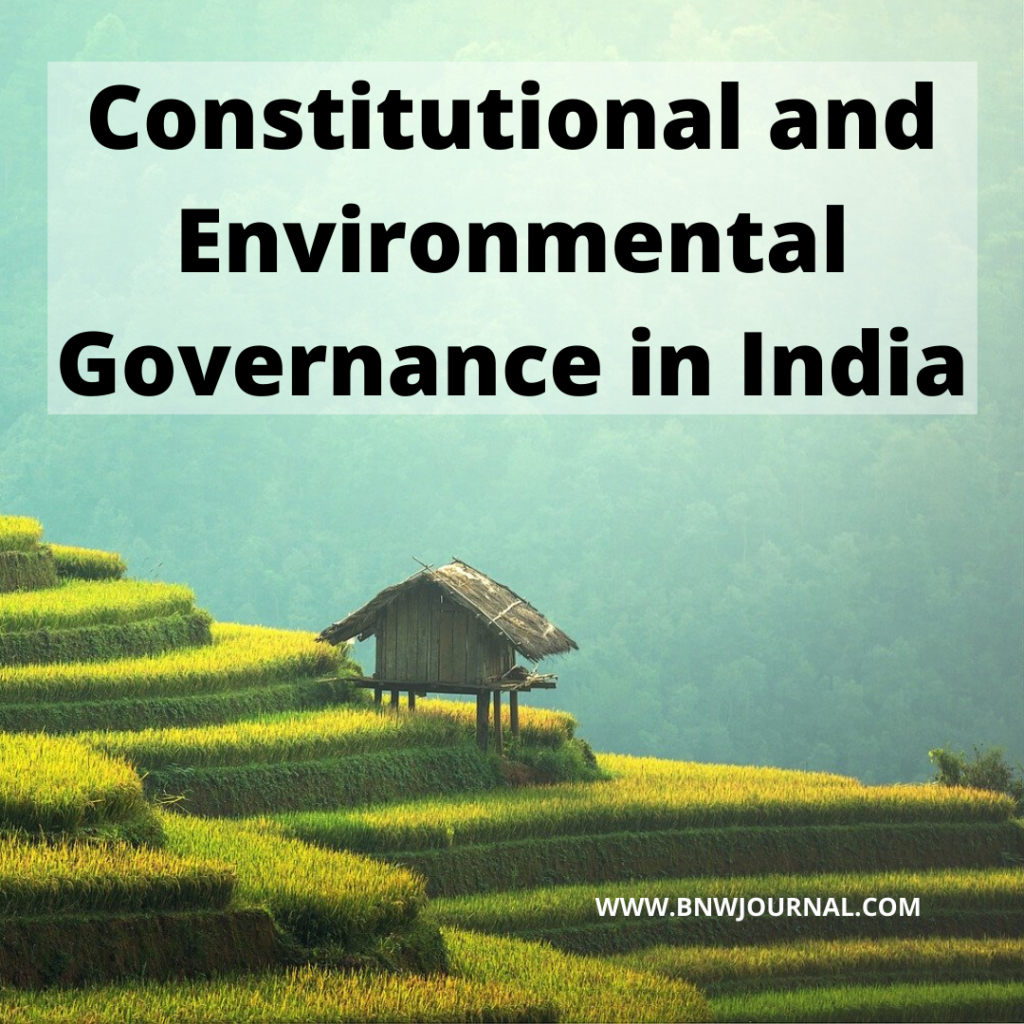![]()
Introduction
The term ‘governance’ was coined by the World Bank in 1989 to connote a negative aspect in the Sub-Saharan development.[1] Although there is no strict definition of the word ‘governance’, it has been identified with agendas of reform and measures as taken by States essentially. Thereafter, ‘environmental governance’ has discourse follow for the looking after of the environment.

As far as the definition of environment is consider, it has a plethora of understandings. It has although been categorise into physical and biological standards. Physical environment includes land, water and air and biological environment includes plants and animals, and both environments are dependent on each other. An interesting point of view start by Professor Sax in his preliminary work that establishes the principle of ‘public trust doctrine’ which is an important aspect of major climate change movements.[2] The PTD turns out to be comprehensive legal solution to environmental problems of the day. The judicial considerations along with constitutional safeguards allow for a health ‘environmental governance’.
There are additional measures take up by the following governments such as the introduction of legislation and establishment of the National Green Tribunal. What we shall follow in this article is such methods and actions of the governments and the constitutional support for these measures.
The Constitutional Perspective
Article 48A of the Constitution of India states:
“The State shall endeavour to protect and improve the environment and to safeguard the forests and wildlife of the country.”
Hence this article as mention in the Directive Principles of State Policy of the Constitution aims at making sure that an unequivocal importance is given to environmental standards and its protection but also no relief by way of legal recourse. Although it is to note that this aspect was come into the constitution much later by the Forty-second amendment act of 1976. There is also article 51A but it is in the way of a fundamental duty.
Hence, it can be argued that in the sense of constitutional governance with respect to the environment, there has been no positive precedent. The problems encountered due to this failed no-power framework has forced environmentalists to go to courts by way of public interest legislations(PILs). This has, in turn, allowed for judicial activism and the pronouncement of a broader definition of article 21. In the case of Subhash Kumar v State of Bihar, the right to a safe environment is as a fundamental right under article 21’s meaning of ‘life’.
National Green Tribunal and the Judiciary
The Natural Green Tribunal is a tribunal set up by National Green Tribunal Act, 2010 to handle cases related to environmental issues. The legislate Act of Parliament defines the National Green Tribunal Act, 2010 as follows:
“An Act to provide for the establishment of a National Green Tribunal for the effective and expeditious disposal of cases relating to environmental protection and conservation of forests and other natural resources including enforcement of any legal right relating to environment and giving relief and compensation for damages to persons and property and for matters connected therewith or incidental thereto.”
The act envisage along the lines of the 186th Law Commission report of India of 2003. It propose the establishment of environmental courts in India. The NGT deals with all cases relating to environmental protection and legal rights related to it. The NGT has all the original, appellate and special jurisdiction with a wide definition of the ‘aggravated person’.
A lot of the NGT’s decisions are based on the precautionary and polluters pay and sustainable development principles. The NGT itself observed in the case of M.P. Patil v Union of India that these three principle find a statutory place in the Indian Environmental Jurisprudence. All development must be confirm by the principles for the safeguard of the environment.
Conclusion
There are laws dealing with the environmental aspects such as the-
- Water (Prevention and Control of Pollution)Act 1974 (Water Act)
- Air (Prevention and Control of Pollution)Act 1981 (Air Act)
- Environment (Protection)Act 1986 (EP Act), Wild Life (Protection)Act 1972
- Forest (Conservation)Act 1980
- Public Liability Insurance Act 1991
- Biological Diversity Act 2002.
These acts of parliament have allowed the governments to take a more proactive approach. Basically towards the protection and safeguard of the environment in their way of governance. Moreover, the interpretations by the judiciary has also allowed for a renewed indulgence in environmental governance in the country. Although, the activism can still said to be in the nascent stages in the country. It is interesting to see the legal developments as they happen.
References:
[1] World Bank, “Sub-Saharan Africa: From Crisis to Sustainable Growth”, World Bank Report (Washington DC, 1989).
[2] Joseph L. Sax, “The Public Trust Doctrine in Natural Resource Law: Effective Judicial Intervention” 68 (3) Michigan Law Review 471-566 (January, 1970).



0 Comments